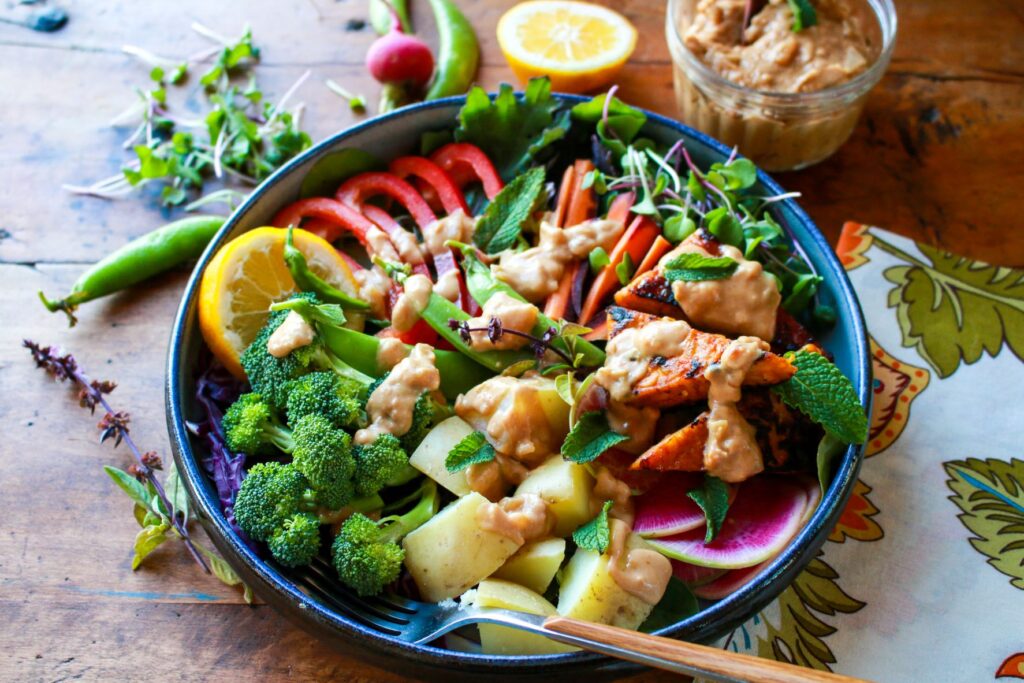Take a Trip Around the World with Plant-Based Global Cuisine for Health and Flavor

One of the best ways to embrace a healthful, delicious plant-based diet is to honor rich, global food traditions, which have been doing plant-powered food really well for centuries. Check out these tips for making your eating style more diverse and adventurous. Take a trip around the world with plant-based global cuisine for health and flavor.
You already probably know that adopting a more plant-based diet based on a variety of whole plant foods has numerous benefits for your mind, body, and soul—as well as the environment. All of those nutrients and phytochemicals flowing through your body leads to numerous health benefits associated with a plant-based diet. But you can take your plant-based diet a step further by honoring a big beautiful world of food traditions and flavors. By doing so, you’ll boost the flavor of your diet, as well as the nutritional profile.

The combination of culture, values, and lifestyle play a major role in the choices you make, especially when it comes to your diet. In comparison to other “diets” that focus solely on losing weight and result in short-term commitment, engaging in a plant-based diet is a long-term dedication that translates into a lifestyle choice for many people — especially those who are focused on their health and environment. As you know, food connects people around the world, within communities, and amongst immediate friends and family, as it brings them together to celebrate a common interest—food. The variety of foods that originate from diverse cultures plays a major role in the expansion of food choices for many, specifically those who engage in a plant-based diet, because of the numerous plant-powered options available. The incorporation of different spices, herbs, seeds, whole grains, pulses, vegetables, and fruits differentiates the dishes that are prepared in each and every culture around the globe. For instance, Indian, Thai, Mexican, Middle Eastern, and Vietnamese cuisines all offer a variety of delicious, unique meals highlighting key plant-based foods and culinary traditions that makes these foods shine!

Check out these five reasons why plant-based global cuisine can infuse your diet with health and flavor rewards.
5 Reasons to Dive into Plant-Based Global Cuisine
1. Global Foodways Embrace Plants. Many cultures simply know how to do plant-based meals right! Rather than emphasizing animal foods high in saturated fat and cholesterol, these food cultures often focus on plant-based foods packed with vitamins, minerals, phytochemicals and fiber. This is because of traditional factors related to food supplies, religion, and customs. For example, Mexican dishes are known for their abundance of legumes, including pinto and black beans, the Mediterranean diet highlights unsaturated and heart-healthy plant-fats such as nuts and olive oil, and the traditional Japanese diet embraces whole soy foods such as edamame, tofu and miso.

2. Cultural Food Traditions Shift the Plate. Our mainstream diets in America are slowly transitioning from the mentality of preparing meals with meat as “the center of the plate” to focusing on plant-based foods as the star of the plate. In fact, we have been influenced by other cultures that simply use meat as a flavoring rather than the main event. This eating style is the basis of many global dishes, such as curries, stir-fries, stews and pasta dishes that are flavored with a small portion of animal protein and a pile of vegetables in order to serve a family sized meal. This is a great way to plant-power your diet.

3. Global Diets Practice Tradition. Many parts of the world, such as Copper Canyon, Mexico and Cameroon, Africa, are cut off from modern society. As a result, the people there still follow the food traditions from the past, relying on local grains and pulses, locally cultivated and foraged fruits and vegetables, and some amounts of local animal foods. In these locations, which hardly rely on the packaged products that line our supermarket shelves, chronic disease and obesity are almost nonexistent. This is a great example of honoring traditions and the past in your modern day diet. Find connections to your own food culture and let it seep into your own cooking.

4. Global Food Cultures Enhance Taste Just Right. Since the beginning of time, people have cherished plants–in particular herbs and spices–not only for their flavor, but also for their health benefits. In many popular global dishes, herbs and spices play a starring role. For example, turmeric, popular in Indian cooking, may protect against cancer, diabetes, heart disease, arthritis, gastrointestinal problems, and Alzheimer’s disease; garlic and oregano used in Italian dishes boast generous levels of anti-inflammatory properties; and hot pepper used in a variety of global-inspired dishes is well known for its pain-relieving effects.

5. Traditional Diets Aren’t Based on “Dieting”. In America, the word “diet” is typically associated with something you are “on” or “off.” In actuality, a diet is simply a style of eating you choose to eat for life, based on personal and cultural values. A diet isn’t ridden with restriction and guilt; the food you eat is meant to be enjoyed and is meant to be a reflection of you, your past, and your culture. And a plant-powered diet is one where you can come to the table with friends and family and celebrate delicious food, that also happens to be healthful.
Try some of my favorite globally-inspired, plant-based recipes:
Peter’s Swedish Waffles
Miso Green Beans and Tofu
Classic Bruschetta
Cretan Gigantes Beans
Indian-Style Potatoes
Main image: Gado-Gado, Sharon Palmer, MSFS, RDN



